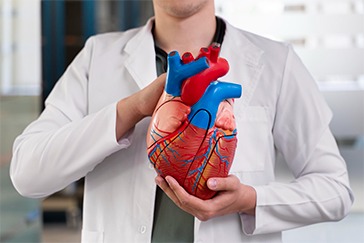 Book Appt.
Book Appt.
 Call Now
Call Now


Congenital heart diseases (CHDs) are a group of structural or functional abnormalities in the heart that occur before birth. They are the most common birth defects, affecting approximately 1 in every 100 babies born worldwide. CHDs can range from mild, asymptomatic conditions to severe, life-threatening defects, making them a significant medical concern. Understanding the complexity of congenital heart diseases is crucial for early diagnosis, effective management, and improved outcomes for affected individuals.
To comprehend congenital heart diseases, it's essential to track the normal development of the human heart. The heart begins to form shortly after conception, with complex processes guiding its growth. Any disruption or error in these intricate stages can lead to congenital heart defects.
Types of CHDs
CHDs are diverse and can affect various parts of the heart. Some common types include:
Causes of CHDs
While the exact cause of most CHDs is often unknown, several risk factors and genetic factors play a role. These can include maternal conditions (e.g., diabetes), exposure to certain medications or infections during pregnancy, and genetic mutations.
Diagnosis and Screening
Early diagnosis is critical for managing CHDs effectively. Prenatal screening through ultrasound can identify some heart defects before birth. After birth, physical examinations, electrocardiograms (ECGs), and echocardiograms are commonly used diagnostic tools.
Symptoms and Impact
The symptoms of CHDs can vary widely, from mild to severe, and may not be immediately apparent. In mild cases, individuals may lead a normal life with minimal or no symptoms. In severe cases, symptoms may include rapid breathing, poor feeding, fatigue, and failure to thrive. Some CHDs can lead to long-term complications if left untreated, such as heart failure or developmental issues.
Treatment and Management
The treatment approach for CHDs depends on the specific defect's type and severity. It may involve medications, catheter-based interventions, or surgical procedures. Some children with CHDs require ongoing medical care and surgeries throughout their lives.
Advances in medical science and technology have significantly improved the outcomes for individuals with CHDs. Minimally invasive procedures, such as catheter-based interventions, have reduced the need for open-heart surgeries in some cases. Moreover, advancements in pediatric cardiology have led to better management strategies and improved quality of life for those living with CHDs.
CHDs not only affect individuals but also their families. Support groups and educational resources are crucial for parents and caregivers to understand the condition, its treatment options, and how to provide the best care and support for their child. These resources can help alleviate anxiety and stress associated with CHDs.
Life Expectancy and Quality of Life
With early diagnosis, appropriate treatment, and ongoing care, many individuals with CHDs can lead full and productive lives. However, it's essential to recognize that the long-term outcomes vary depending on the type and severity of the defect.
In conclusion, congenital heart diseases are a complex and diverse group of conditions that affect individuals from birth. Understanding the intricacies of these defects, their causes, diagnosis, and treatment options is essential for healthcare professionals, families, and society as a whole. With early detection, appropriate medical intervention, and ongoing care, individuals with CHDs can lead fulfilling lives, underscoring the importance of continued research and support for this population.
SHALBY Sanar International Hospitals provides extensive medical procedures backed up with our state-of-the-art technology and a team of highly qualified & experienced clinical experts.

Life-Changing TAVR Success Story | Dr. D.K. Jhamb | SHALBY Sanar International Hospitals

Timely Angiography Procedure Saves life of Iraqi Patient.

Rajiv Makhni, Managing Editor of NDTV, Shares His Experience at SHALBY Sanar International Hospitals

A successful treatment procedure helped Ms. Suri get over breathlessness
Our doctors pen down their research findings and experiences from time to time. Their words provide deep insight into the latest techniques, technologies and other advancements in healthcare. It provides expert answers to all kinds of health questions for real-life issues.
VIEW ALL




Since the day of its foundation, SHALBY Sanar International Hospitals is committed to provide comprehensive healthcare services. It regularly organizes awareness programs in its premises and encourages outdoor healthcare activities and camps with an intent to put focus on preventive healthcare.
VIEW ALL